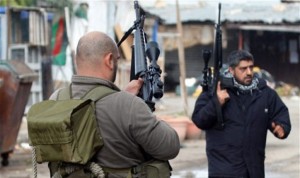 Foreign-backed militants operating in Syria (file photo)[/caption]
Foreign-backed militants operating in Syria (file photo)[/caption]BEIRUT (AP) -- The commander of Syria's main Western-backed rebel group appealed for unity in the insurgency's ranks Friday, trying to ease rifts with Islamic extremist rivals ahead of an international peace conference for Syria in January, over which the opposition is sharply divided.
In a sign of the bitterness over the talks, the leader of one of the most powerful militant factions, the al-Qaida-linked Nusra Front, vowed to torpedo the talks and branded as a traitor anyone in the opposition who joins the gathering with the government of President Bashar Assad.
The contrasting rhetoric underscored the enormous difficulties that lie ahead even as officials meeting in Geneva confirmed attendance by both the opposition and Assad's government at the first face to face talks to try and end a savage, 3-year-old war that has killed over 120,000 people and uprooted millions of others.
Other stumbling blocks emerged as international officials tried to draw up a list of invitees. The U.N. Arab League's Syria envoy, Lakhdar Brahimi, said the opposition has yet to decide on how it will be represented at the conference, and the U.S. is blocking the participation of Iran, a staunch supporter of Assad.
"The U.S. is still not convinced Iran's participation would be the right thing to do," Brahimi told a news conference after a day of meetings with Russian and U.S. officials and Syrian neighbors who have been struggling to cope with the conflict and the more than 2.3 million Syrian refugees.
The Syrian opposition has also strongly objected to the participation of Iran.
The gathering did agree on a list of about 30 nations that will attend the opening day of speeches on Jan. 22 in the Swiss city of Montreux - including Saudi Arabia and Qatar, both key backers of the opposition, Brahimi said. Iran's participation was the only sticking point, but was still a possibility.
The actual negotiations between Assad's government and opposition representatives begin on Jan. 24 at the U.N.'s European headquarters in Geneva.
The talks have been put off repeatedly, in part because of fundamental disagreements over the fate of Assad but also because of disputes over who should represent the Syrian opposition and government, and whether Iran, Saudi Arabia and other regional powers should be at the table.
The Western-backed Syrian National Coalition, the main alliance of political opposition groups, has said it will only negotiate if it is agreed from the start that Assad will leave power at the end of a transition period. Many rebel fighters inside Syria flatly reject negotiating with Assad's regime.
The regime has rejected such a demand, saying Assad will stay at least until the end of his term in mid-2014, and he will decide then whether to seek re-election.
Rebel infighting has weakened an already fractured opposition movement, casting further doubt on its ability to negotiate in Geneva with any effectiveness. As they carve out zones of control on the ground, extremist factions have battled with more moderate rebels from the Free Syrian Army, which are nominally led by the Western-backed Supreme Military Council headed by Gen. Salim Idris. Islamic factions have launched a rival grouping known as the Islamic Front.
Thursday night, Al-Jazeera TV aired what it said was an interview with Abu Mohammad al-Jolani - the first known interview with the leader of the al-Qaida linked Jabhat al-Nusra, or Nusra Front.
"Geneva is an attempt to resuscitate the regime," he said, vowing not to recognize any results from it.
Those who take part "do not represent the people who sacrificed with their blood" and are "accomplices in selling out the blood that has been shed," he said. He spoke on camera with his face concealed. Al-Jazeera did not give details on where and when the interview took place.
"We cannot allow the Geneva 2 game to fool the nation, to push us back 50 or 100 years," al-Golani added.
His comments were in sharp contrast to an appeal made by Idris for all opposition fighters to join ranks, pledging to do everything he can to stave off rebel infighting.
In a statement, he said all rebels in Syria who believe in the "goals of the revolution" are "our brothers." He spoke after a meeting late Thursday in Istanbul with U.S. Ambassador to Syria Robert Ford.
The faction that Idris leads, the Supreme Military Council of the Free Syrian Army rebel umbrella group, has been dealt a severe blow by the rapid rise of Islamic extremist groups in Syria.
The SMC is struggling to maintain international support as extremists expand their hold across rebel-held territories. Earlier this month, the U.S. and Britain suspended nonlethal military aid to the opposition in Syria, after Islamic militants captured warehouses that contained a cache of machine guns and ammunition intended for Idris' SMC.
"The Supreme Military Council reaffirms that it is working to secure military and relief supplies to the fighters on the ground and to ward off strife, unite ranks and assimilate all fighters on the ground who believe in the goals of the revolution of the Syrian people," Idris said.
Idris has said he will take part in the Geneva talks, but it is still unclear if any other rebel groups will attend. Brahimi said he was told by the opposition that they would form their delegation in late December or early January.
By The Associated Press
The Iran Project is not responsible for the content of quoted articles.










